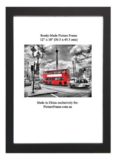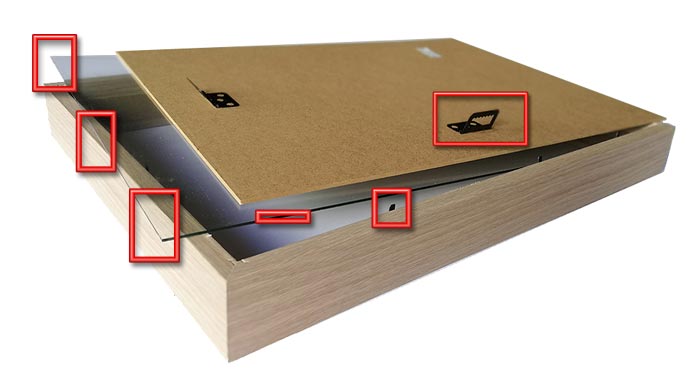![]() "Can I put the poster in the frame while I'm here?" is a question regularly asked by some Customers who have just
"Can I put the poster in the frame while I'm here?" is a question regularly asked by some Customers who have just  bought one or more of popular and inexpensive, ready-made poster frames. Now, we understand why they may be asking this, sometimes they even tell us. They are anxious to frame their art quickly and want to hang it as soon as they get home. They would like to frame it up at our store because it is full of spare poster frames as well as being large and spacious. Unfortunately, when this is asked, we always have to decline the request. The reason for this answer involves the evolvingdeveloping continuously and expanding Federal, State and Local Government statutes, laws and regulations pertaining public, products and other liabilities. Aside from personal and public liability claims, there exist statutory Australian Consumer Protection Laws which allow any consumer to claim compensation from a supplier or manufacturers if the product they bought causes any monetary loss or personal injury damage.
bought one or more of popular and inexpensive, ready-made poster frames. Now, we understand why they may be asking this, sometimes they even tell us. They are anxious to frame their art quickly and want to hang it as soon as they get home. They would like to frame it up at our store because it is full of spare poster frames as well as being large and spacious. Unfortunately, when this is asked, we always have to decline the request. The reason for this answer involves the evolvingdeveloping continuously and expanding Federal, State and Local Government statutes, laws and regulations pertaining public, products and other liabilities. Aside from personal and public liability claims, there exist statutory Australian Consumer Protection Laws which allow any consumer to claim compensation from a supplier or manufacturers if the product they bought causes any monetary loss or personal injury damage.
Aggrieved or affected claimants may claim within 3 years incurring the claimed loss or damage. In the main, businesses, whether big or small, need to purchase public liability insurance to defend and protect themselves against any claims made against them by third parties ( usually Customers or Clients ) in respect of their legal liability for personal injury or property damage arising during the course of their businesses. Such claims may be brought by everyone and anyone with even a fleeting connection or interaction with the picture framing business, its owners, its employees or its products.
Here are some examples:
Claim a) A Customer enters the store, walks around a prominent, free-standing, yellow-coloured A-sign warning: 'Careful! Wet Floor! ". sign conspicuously standing in front of the entrance. He or she than walks a little farther onto a liquid spill. The Customer slips, falls and unfortunately sustains an injury. The Customer's legal advisors then suggest that the store management is somehow at fault, remiss or negligent and that it may be be sued for damages.
Claim b) A Customer walks into the store and buys an A2 ready-made poster frame. He then surreptitiously moves to an unsupervised area where he tries to insert a poster that he was carrying inside the frame. While doing so he cuts himself, with the glass, starts to bleed and goes off to seek medical treatment which later leads to an infection and complications. The Customer's legal advisors then advise the Customer that that the store management or supervision at the store that the poster frames may have been deficient, or inadequate, and their negligence may give rise to a liability legally actionable for damages.
Claim c) A Customer visits the store, purchases some poster frames and also receives some complimentary wall hooks with which hang the newly-purchased frames. The Customer returns home and hangs the poster frames with the hooks that he was given at the store. Soon after, while sitting down one of hooks fails, causing the poster frame to fall onto a mantelpiece ornament which in turn tumbles and falls onto the Customer's face causing a facial injury. Alas, the laceration also begat medical problems. The Customer's legal advisors then opine that the store management supplied him with faulty picture hanging accessories and they are therefore at fault, remiss or negligent and that it may be be sued for damages.
Claim d) A Customer brings in a valuable Limited Edition print to be framed. The print is framed and consigned back to the Customer who inspects it, approves it, pays for it and departs. A few days later the Customer rings, claims to have since sighted a tear, hole, crease or other defect that he or she had not noticed before. The Customer's legal advisors then write to the picture framer asking for a full refund , plus additional compensation for the damages allegedly incurred.
The above, brief, examples list could go on endlessly since there are all sort of weird or wonderful reasons why third parties, Customers or anyone really, could or would seek, rightly, or wrongly for redresses to wrongs, problems, issues either real or imagined.
Liabilities can also be vicarious, where a reseller or retailer may be liable for another's party' mistake, omission, error or negligence if the retailer knew but failed to take reasonable steps to prevent the wrongful act. It follows that small business proprietors can be brought to book if it can shown that they were aware that the poster frames or products they sold were faulty, or even risky, even if there was a small possibility of these causing damage or injury to others. It can even be just as risky if a complainant or plaintiff can argue and successfully show that they failed to undertake through due diligence of their suppliers or manufacturers.
This is where the whole issue can get very tricky because we know of hardly any retailers who undertake or commission independent, professional study or investigations of the poster frames or products they source by wholesale and retail by retail .
Generally speaking, a retailer will stock and keep on retailing products or poster frames until it runs out, becomes obsolete, or unprofitable, or there is some sort of quality defect, manufacturing problem or reliability issue with it.
According to an insurance source, due diligence investigation best-practice requirements vary according to the type, nature and intended use of a product to be marketed and sold. However, it is recommended that any merchant or retailer ought to:
a) become acquainted with the manufacturers and their manufacturing processes by personally visiting the places and locations of their factories where the products are made as well as requesting testing, safety and quality control procedures and protocols and:
b) add contract buyer protection clauses to embody, include and maintain guarantees and warranties for any and l products thereat and thereby sourced as well unilaterally reviewing and batch testing these to ensure Australian Standard Safety standards and statutory compliance requirements, whether Federal State or Local.
Some old-time retailers at time think that because they are not the actual manufacturer of a product the might be able to defend or defend any liability claims arising as a result of its usage or handling.
However, fiendishly clever and all-reaching consumer legislation has put paid to that defence by legislating that a manufacturer is deemed to be: 1) any business involved in manufacturing or putting together any goods, 2) importing whichever and whatsoever goods if their manufacturer does not maintain a domestic office or trading house, 3) imports any products with its own logo, branding, name or identification and 4) permit a third party entity or business to copy, publicize or distribute goods as manufactured by another merchant even though this may be incorrect.
Be that as it may, let's get back to the cornerstone of this post, that being the issue of not permitting Customers to do any work on one's own business premises.
If we even cursorily glance at the A4 Natural Wood Shadow Box illustration below we will notice several edges, surfaces and objects with red paper-clip highlighting. All of these can be. and are, dangerous to untrained, inexperienced, or unskilled users in some way. The sharp glass edge may cause a gash, the acute steel flexible tabs may do the same, and the serrations in the sawtooth hanger can also inflict likewise injuries.
Picture framers, when retailing photo frames, poster frames picture frames and any other types and kinds of frames or goods, are also constructing clear and direct relationships with their Customers who are also purchasers of the picture frames, or retail goods.
As retailers, they have a responsibility not only for properly explaining inherent products' dangers an perils but also for appropriately supervising Customers so that they may avoid hurting themselves. While having public and product liability may limit some risks, should the products they sell cause damage or injury, Australian Consumer Law will hold them responsible and liable for any actionable consequences if Customers handle, manipulate, modify, disassemble and assemble goods in their retails premises.
Speaking for ourselves, we must admit that, in the past, we did allow the occasional Customer, whom we knew well, to do his or her own poster frames fitting up on our workbenches. Sometimes these Customers asked to borrow a tool or utensil such as air staples, snap knife or scissors. We asked them if they knew how to use what they were borrowing and if they said yes, we left it at that and told them to go ahead.
Such a laissez-faire attitude is simply unthinkable in today's hyper-litigious times. Besides, the law has expanded, broadened and enlarged the so called 'Duty of Care' obligation so far and so much that before letting anyone, even a total stranger, use or borrow anything at all, one may ponder on the legal duty to first adequately train the borrower in any and all handling, usage and safety aspects.
This is why it is wise and advisable, if not definitely necessary, to obtain general liability as well as product liability insurance to fund legal fees, proceedings and any awarded compensation to any aggrieved and successful claimant or complainant.
it is a sad reflection of today's society that laws are chipping away at that basic tenet of social behaviour, that of personal responsibility. When something, anything, happens to some complainants, it seems to never be their fault, but someone else's. We can see and hear this all the times on the news. Below are three, well known, past exemplar legal proceedings:
1) A borrower stops making the repayments for his investment loan, eventually defaults on his mortgage, finally loses his investment property and later decides to sue the lending bank for having lent him too much money.
2) A couple discovers that their teenage is an illiterate analphabet, opine that it must be the school's fault for failing to to educate him properly, and so they take the education department to courts seeking compensation.
3) A loner starts drinking beer believing that the brewer's advertisements that doing so is attractive to beautiful women. Alas, no beautiful woman is attracted either to him or to his drinking. Disappointed, he begins legal proceedings against the brewer to compensate him for this failure which caused him psychological distress, mental anguish and financial loss.
Any fair-minded, average person will recognize the nature of these claims and the unreasonableness of the claimants' complaints.
But that's not the astounding revelation since being fully or partially irrational and unreasonable has long been part and a parcel of man's frail psyche. The amazing thing are the cabals of no-win, no-pay of gun-for-hire, legal hireling bands who tout, pursue and proceed with these kinds cases and of litigation work in the hope of winning fat pay-cheques. Unfortunately, sometimes, some of them do.
Aside and besides the glaringly evident lucre factor, a contributing element to this growing pandemic of people wanting money for real or imagined, present, past or historical slights, offences, mistakes, wrongs or torts is the 'woke' trend.
This modern-day social pestilence originated in the USA and is being rapidly adopted all over the worlds as well as here, in Australia.
in a nutshell 'woke' is being conscious, aware, attentive, cognizant and pro-active to any to any and all of the world's perceived ( whether the perception is spurious or genuine, in accurate, or accurate, incorrect or correct, does not seem to matter ) issues pertaining to social, cultural, racial, economical, political or historical wrongs, failings, marginalizations, discriminations, or injustices.
We will end this post by pithily observing that if the world keeps going this way, anyone and everyone will be too scared of doing anything for anybody - lest they get sued.









So that means that if I come in and borrow your screwdriver to unlock the door of my car and cut myself accidentally while doing it I can sue you? Great! I’ll be in next week to rip you off!